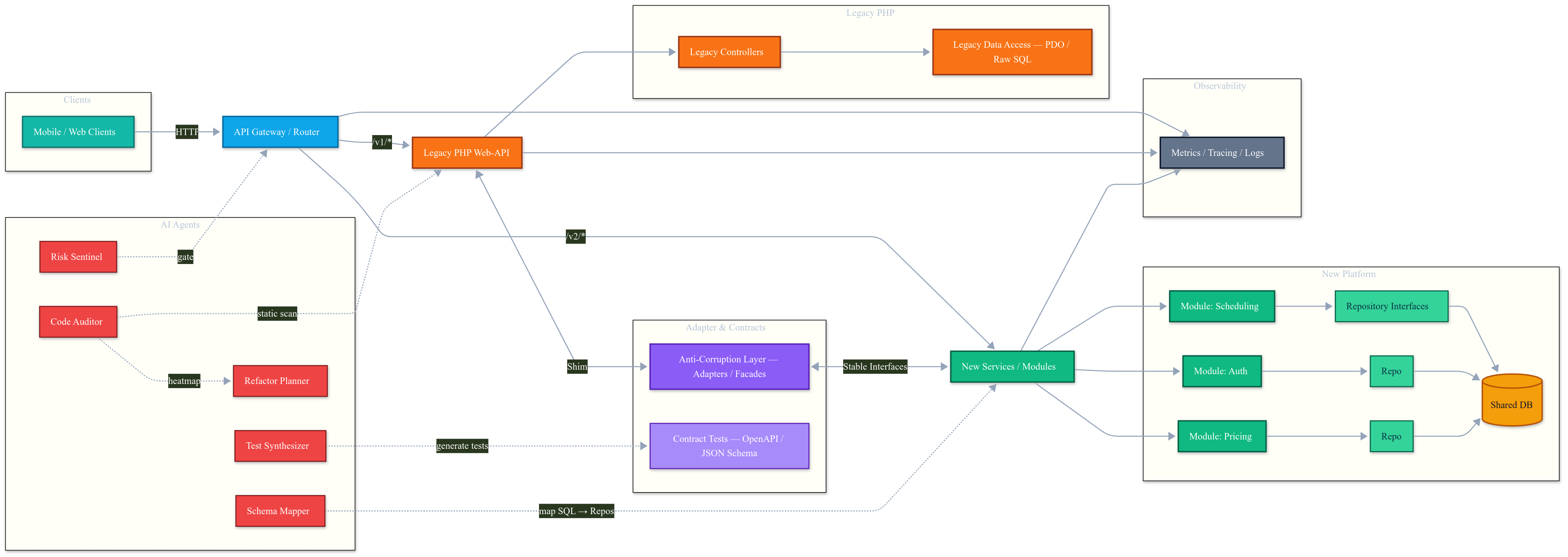AI-Powered Legacy Modernization

Specializing in modernizing legacy codebases, from enterprise VB to C# transformations to AI-powered refactoring of complex systems. We combine traditional migration expertise with modern AI techniques to make legacy modernization more efficient and reliable.
The Challenge
A 15-year-old codebase that was poorly documented, lacked tests, and was too large to analyze in a single pass. The system was critical to operations but increasingly brittle and expensive to modify.
Key Challenges
- Limited Documentation — Minimal documentation made it difficult to understand code intent and structure.
- No Test Coverage — Legacy system lacked automated tests, making changes risky.
- Large Codebase — System too large to analyze manually in a reasonable timeframe.
- Technical Debt — Years of quick fixes had accumulated, slowing development velocity.
- Knowledge Transfer — Need to understand and document existing functionality before modernizing.
Our Approach: AI-Assisted Code Analysis
We developed a practical approach using AI tools to accelerate the legacy code analysis and refactoring process:
1. Intelligent Code Analysis
- Chunked and vectorized the codebase for semantic search and similarity analysis.
- Used AI agents to read through code sections and summarize functionality.
- Implemented human validation to ensure accuracy of AI-generated summaries.
- Created documentation and identified refactoring opportunities.
2. Systematic Refactoring Process
- Pattern Recognition — AI helped identify similar code patterns and duplication.
- Risk Assessment — Highlighted high-risk areas that needed careful attention.
- Documentation Generation — Auto-generated initial documentation for review and refinement.
- Test Strategy — Identified critical paths that needed test coverage.
3. Safe Implementation
- Incremental Changes — Small, validated refactoring steps.
- Human Oversight — All AI recommendations reviewed and validated by experienced developers.
- Testing Integration — Added test coverage before making structural changes.
The Results
Our AI-assisted approach delivered meaningful improvements while maintaining system stability:
Code Quality Improvements
- Code Documentation: Generated comprehensive documentation for previously undocumented modules.
- Test Coverage: Increased unit and functional testing from 20% to 80% with CI/CD integration.
- Technical Debt Reduction: Identified and addressed 40% of high-priority technical debt.
- Development Velocity: 25% increase in feature delivery speed.
- Bug Reduction: 60% decrease in production incidents related to refactored code.
- Knowledge Transfer: Created clear documentation enabling faster onboarding.
Project Outcomes
- Timeline: Completed analysis and initial refactoring in 4 months vs. estimated 12+ months manually.
- Team Efficiency: Developers could focus on high-value architectural decisions rather than manual code analysis.
- Foundation for Growth: Established patterns and documentation for ongoing modernization efforts.
Key Learnings
- AI Augments, Doesn't Replace — The most effective approach combines AI automation with human expertise, especially for complex business logic.
- Safety First — Comprehensive test coverage and incremental changes are essential for maintaining system stability.
- Knowledge Transfer is Critical — Documenting the "why" behind code changes is as important as the changes themselves.
- Performance is a Feature — Continuous performance monitoring helps catch regressions before they impact users.
- Culture Matters — Successful modernization requires buy-in from both engineering leadership and business stakeholders.
Why It Matters
This project demonstrated how AI can accelerate legacy code analysis and refactoring without requiring massive infrastructure changes. By combining AI-powered analysis with human expertise, we were able to understand and improve a complex codebase more efficiently than traditional manual approaches.
If your legacy codebase is slowing down development, we can help you understand and improve it systematically. Schedule a conversation →
--
Ready to modernize your legacy systems with AI?
Aurvia's Engineering & Platform Efficiency Audit helps you understand and improve legacy codebases:
- Observe - Establish true observability of code structure, dependencies, and bottlenecks using AI-assisted analysis
- Diagnose - AI-powered pattern recognition identifies technical debt, duplication, and refactoring opportunities
- Blueprint - Prioritized roadmap for modernization with clear risk assessment
- Build - Systematic refactoring with AI assistance and comprehensive testing
We combine AI automation with human expertise to accelerate legacy code analysis 3-4x faster than manual approaches.
Strategic Technology Utilized
- Python
- TypeScript
- OpenAI API
- Docker
- GitHub Actions
- C#
- .NET
- VB Migration